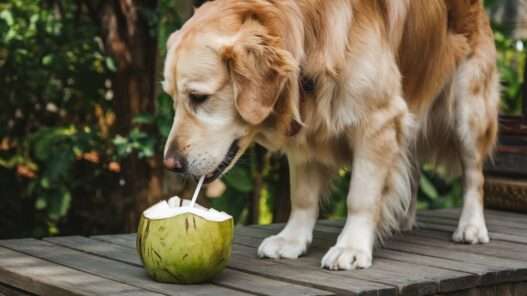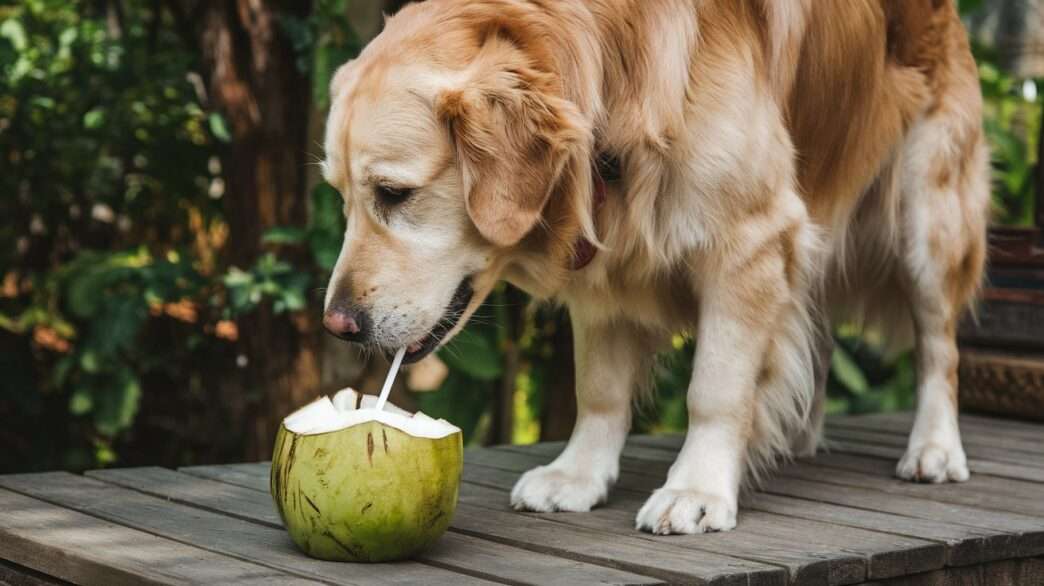Coconut water is a popular, natural beverage known for its hydrating properties and nutritional benefits for humans. But when it comes to dogs, the question of whether they can safely consume coconut water requires careful consideration. Here’s an in-depth look at the pros, cons, and guidelines for giving coconut water to your dog.
Benefits of Coconut Water for Dogs:
1. Hydration: Coconut water is renowned for its hydrating properties. It contains electrolytes such as potassium, sodium, and magnesium, which can help replenish fluids and maintain electrolyte balance. For dogs, especially those who are active or have been in the heat, coconut water can be a good supplementary source of hydration.
2. Nutrient-Rich: Coconut water provides essential nutrients that might be beneficial for dogs. It contains vitamins like Vitamin C and several B vitamins, along with minerals such as calcium and phosphorus. These nutrients can contribute to overall health when given in appropriate amounts.
3. Low Calories: Compared to other beverages, coconut water is relatively low in calories, making it a better option than sugary drinks or treats.
Potential Risks and Concerns:
1. High Potassium Levels: While potassium is essential, too much of it can be harmful to dogs. Excessive potassium can lead to health issues such as hyperkalemia (high potassium levels in the blood), which can affect heart function and muscle health. Coconut water has a higher potassium content compared to plain water, so it should be given in moderation.
2. Natural Sugars: Coconut water contains natural sugars, which can contribute to weight gain and dental issues if given in large amounts. Excess sugar intake can also lead to diabetes in dogs over time.
3. Additives and Flavors: Commercial coconut water may contain added flavors, preservatives, or artificial sweeteners, which are not suitable for dogs. Always check the ingredient list to ensure that the coconut water is free of harmful additives.
4. Digestive Upset: Introducing any new food or beverage into a dog’s diet can sometimes lead to digestive upset, including diarrhea or vomiting. It’s important to start with a small amount and observe how your dog reacts before offering more.
Guidelines for Giving Coconut Water to Dogs:
1. Choose Pure Coconut Water: Select plain, unsweetened coconut water with no added ingredients or flavors. Organic coconut water is often a good choice as it is less likely to contain harmful additives.
2. Moderation is Key: Coconut water should be given in moderation. A small amount, such as a few tablespoons, is generally sufficient for most dogs. Larger quantities can lead to excessive potassium or sugar intake.
3. Monitor Your Dog: After giving your dog coconut water, observe them for any signs of digestive discomfort or allergic reactions. Symptoms might include vomiting, diarrhea, or changes in behavior.
4. Consult Your Veterinarian: Before introducing coconut water or any new food into your dog’s diet, it’s wise to consult with your veterinarian. They can provide personalized advice based on your dog’s health, size, and dietary needs.
5. Use as an Occasional Treat: Coconut water should not replace your dog’s regular water intake. It should be used as an occasional treat rather than a staple in their diet.
Can dogs drink coconut water everyday?
No, Dogs should not drink coconut water every day. While it can be a healthy, hydrating treat in moderation, daily consumption is not recommended due to its natural sugar and potassium content. Too much coconut water can lead to an imbalance in electrolytes or excess calorie intake. It’s best to offer it as an occasional treat and ensure that regular water remains your dog’s primary source of hydration. Always monitor your dog’s reaction and consult your veterinarian for personalized advice.

























